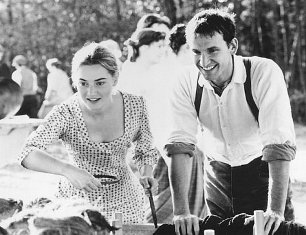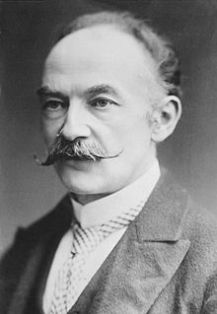Jude the Obscure
by J.D. Cook
*Spoilers Ahead*
I have now read three Thomas Hardy novels and they have all ended in death. Jude the  Obscure is perhaps the darkest of them all. It follows the turbulent love affair of a University aiming young man named Jude Fawley and his intellectual cousin Sue Bridehead. Traditional marriage of the late 19th century is dissected and attacked here as both Jude and Sue have horrible first marriages. Jude is tricked into marriage by a local bar maid, Arabella, who has been around the block and Sue marries the old schoolmaster Phillotson, who she is physically repulsed by.
Obscure is perhaps the darkest of them all. It follows the turbulent love affair of a University aiming young man named Jude Fawley and his intellectual cousin Sue Bridehead. Traditional marriage of the late 19th century is dissected and attacked here as both Jude and Sue have horrible first marriages. Jude is tricked into marriage by a local bar maid, Arabella, who has been around the block and Sue marries the old schoolmaster Phillotson, who she is physically repulsed by.
Eventually those marriages end in divorce thanks to the lust of Arabella for other men and the kindness of Phillotson. Sue and Jude live happily in love but not married for a good number of years. They both decide they do not need marriage to verify their love and view it as something that often drains the love from a relationship. Eventually Arabella returns and announces she had a child after marring Jude. She gives the kid to Jude and Sue because she does not want to upset her new husband with him. The boy called, Father Time, is taken in and loved by Sue and Jude who get on quite well never marrying and only letting people assume they are married. They have three children to accompany the eldest.
Here is where the great tragedy of the novel comes into play. Father Time comes to believe the children a burden on the family after a conversation with Sue who is exasperated at having to hunt for lodgings that would accept her with children. As a result he convinces all the children to kill themselves and kills himself. After this Sue goes off the rails and believes the death of her children at the hands of Arabella’s is a sign from God that they are both still married to their first lovers. She then splits from Jude and returns to Phillotson despite not loving him and still being repulsed by him. Soon after Arabella re-marries Jude as well; although she needs a great deal of alcohol to get him to agree and almost immediately regrets it. Jude then dies after visiting Sue one last time at a Church where she admits her love for him before running off and regretting her actions.
Much like the Woodlanders and Tess of the D’Urbervilles this novel illustrates life as full of ill turns and horrible ironies. There are many moments in the book where Hardy muses  on why people must be born in a world that doesn’t want them. These moments feel like pro-choice arguments but due to the time period Hardy wrote in I don’t believe that is what he was trying to convey. It’s just a 21st century man’s interpretation. There is also a close observation of the late 19th centuries Academic system. Jude despite being a self taught man with passion for learning cannot break into Academia because of his class status. He is forced to spend his life as a stone mason as a result of this. I would love to fully analyze this novel in a deeper context one day but for now I will leave you with my belief that Hardy, despite being exceedingly dark, is my favorite novelist from the late 1800s.
on why people must be born in a world that doesn’t want them. These moments feel like pro-choice arguments but due to the time period Hardy wrote in I don’t believe that is what he was trying to convey. It’s just a 21st century man’s interpretation. There is also a close observation of the late 19th centuries Academic system. Jude despite being a self taught man with passion for learning cannot break into Academia because of his class status. He is forced to spend his life as a stone mason as a result of this. I would love to fully analyze this novel in a deeper context one day but for now I will leave you with my belief that Hardy, despite being exceedingly dark, is my favorite novelist from the late 1800s.
